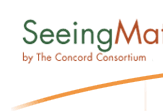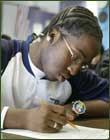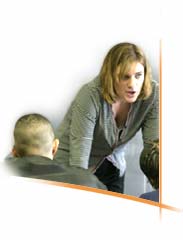         |

People Behind Seeing Math™
 Many
people contributed to the development of Seeing Math™. We would like
to acknowledge the efforts of the following people: Many
people contributed to the development of Seeing Math™. We would like
to acknowledge the efforts of the following people:
Project Team
Robert Tinker,
President & Chairman, The Concord Consortium. Dr. Robert Tinker
is the Principal Investigator of The Seeing Math™ Telecommunications
project. Dr Tinker earned his PhD in experimental low temperature
physics from MIT and has taught college physics for ten years. For
30 years, he has pioneered innovative approaches to education
that exploit the power of technology. He was the first to use electronic
networking to permit students to collaborate on dispersed environment
investigations. The initial result of this work was the NGS Kids
Network, the first curriculum making extensive use of student collaboration
and data-sharing. This success led to the Global Lab and GLOBE projects
as well as the development of LabNet, an early use of networking
to support teacher professional development. He has also pioneered
studies of online courses for students, teachers, and university
faculty. He started the non-profit Concord Consortium 10 years
ago to concentrate on applications of technology in education.
E-mail: rtinker at concord dot org
Raymond Rose,
Vice President, The Concord Consortium. Mr. Rose is Project
Director of the Seeing Math™ Telecommunication Project. He is an
education specialist with more than 20 years experience working
within schools as a trainer, consultant, and policy maker. He has
provided workshops, training, and technical assistance to school
districts and state departments of education across the country
on topics that include appropriate use of technology, equity in
instruction in mathematics and science, instructional methodology,
school improvement, assessment, policy development, and strategic
planning. At The Concord Consortium, Mr. Rose's duties include conducting
research and developing educational applications that address educational
problems, and managing Concord Consortium projects. He is The Concord Consortium's
industry analyst for online delivery tools, and manages the technological
relationships of various projects and maintains communications
with business and educational partners. He was Project Director
of INTEC, a National Science Foundation project that developed a
cutting edge online graduate level professional development course
for mathematics and science teachers. He holds a Masters degree
in education.
E-mail: rrose at concord dot org
Joanna Lu, Seeing Math™ Project Managing
Director, The Concord Consortium. Ms. Lu has developed interactive
media for both commercial and non-profit educational venues. Most
recently she was Senior Project Manager for HighWired.com, a large-scale
web content portal targeted at the high school education market.
She was also Project Director for The Human Genome Project, an interdisciplinary
high school series, funded by the National Institutes of Health
under the Ethical, Legal and Social Implications Program. In order
to introduce students to the field of bioethics, she developed and
produced a program containing original case study video dramas,
teachers' guides, suggestions for student projects, and written
curriculum material. The program developed the use of computer and
live satellite network communication among students, teachers, and
leading experts in the fields of genetics, medicine and ethics.
She holds a Masters degree from the Harvard University Graduate
School of Education.
E-mail: jlu at concord dot org
George Collison,
Senior Curriculum Developer, The Concord Consortium is the Content Specialist on the Seeing Math™ Telecommunications Project. He has designed in-service materials in pre-algebra for INTEC, a nationally-recognized professional development program. He has also worked on online algebra courses with the Texas Education Authority and on calculus courses with the Virtual High School. He is also the lead author of Facilitating Online Learning, a guidebook for online moderators and instructors. Previously Dr. Collison served as faculty in math and science education at the University of Massachusetts at Dartmouth.
E-mail: gcollison at concord dot org
Fadia Harik Senior Curriculum Developer, is an Associate Professor at the University of Massachusetts at Boston working on issues of public and community service. As a Senior Scientist at BBN she led the pioneering project Mathematical Inquiry Through Video. Her work in teacher and mathematics education includes projects and research on integrating technology in teacher education; using and developing effective tools for teacher professional development through distance learning; enhancing a constructivist pursuit of mathematical inquiry through technology.
E-mail: fadia dot harik at umb dot edu
Alvaro H. Galvis,
Seeing Math™ Project Director of Research, The Concord Consortium. Dr.
Galvis is the co-Project Director of the Seeing Math™
Telecommunications Project. He is also the project director for
CAPTIC-Peru and CONGENIA-Colombia, two Concord Consortium initiatives
that help rural education in developing countries benefit from the
educational opportunities from Information and Communication
Technologies. Dr. Galvis founded and led UNIANDES-LIDIE, the R&D
Lab on Informatics as Applied to Education of the Systems and Computing
Department of the University Los Andes, Bogota, Colombia. One of his projects,
Ludomatica, an information and communication technology innovation, was
awarded the Global Bangemann Challenge in Stockholm in 1999. He is also a consultant
in Central and South America, working for OAS, IADB, UNESCO and World
Bank, and is the editor-in-chief of Revista Informatica Educativa
(Review of Informatics as Applied to Education).
E-mail: agalvis at concord dot org
Judah L. Schwartz is Visiting Professor of Education and Research Professor of Physics and Astronomy at Tufts University. He is also Emeritus Professor of Engineering Science and Education at the Massachusetts Institute of Technology and Emeritus Professor of Education at the Harvard Graduate School of Education. His current research interests include the design of microcomputer software environments to improve the teaching and learning of science and mathematics and the application of cognitive science techniques to the study of mathematics and science education. He has been a visiting Professor at universities in France, Italy and Israel, has consulted and lectured widely in this country and abroad and published extensively in the areas of educational technology and assessment. Professor Schwartz's most recent major publications are a book-length case study of educational reform entitled "The Geometric Supposer; What Is It A Case Of?" and "Software Goes to School: Teaching for Understanding in the Age of Technology", a book co-edited with colleagues from the Educational Technology Center at Harvard.
E-mail: judah at concord dot org
Back to Top
Advisory
Board
Richard Carter
is an Associate Professor in the School of Education at Lesley University specializing in Integrating Technology into the Curriculum in both online web- based and face-to-face formats. He also develops mathematics web resources for the ARC Center, a NSF-sponsored elementary math curricula, and works on the authoring team for a new middle school mathematics program, IMPACT, published by Everyday Learning.
E-mail: rcarter at mail dot lesley dot edu
Marvin Cohen
is the Director of Instructional Technology, and director of a variety of technology-based projects, at Bank Street, New York City. He is currently directing a project aimed at supporting the development of technology use by teacher candidates in field placements. Other projects include Project EXPERT (Atlantic Philanthropies) and Project DEEP (the College's PT3 Implementation Grant), both developed to build faculty capacity to use technology in their graduate school teaching. He was a co-designer of the Mathematics Learning Forums (Annenberg CPB, 1994), a distance education project; and a co-founder of Bank Street's Center for Minority Achievement (a middle school reform project) and the Mathematics Leadership Program at Bank Street.
E-mail: mcohen at bnkst dot edu
Beatriz D'Ambrosio,
is an Associate Professor in Mathematics Education in the School of Education at Indiana University, Purdue University Indianapolis. Dr. D'Ambrosio has been a Principal Investigator for the Indiana Mathematics Initiative and is developing an asynchronous online teacher professional development forum for sixth grade mathematics teachers.
E-mail: bdambro at iupui dot edu
Chris Dede is the Timothy E. Wirth Professor of Learning Technologies at Harvard’s Graduate School of Education. His fields of scholarship include emerging technologies, policy, and leadership. Chris has served as a member of the National Academy of Sciences Committee on Foundations of Educational and Psychological Assessment, a member of the U.S. Department of Education’s Expert Panel on Technology, and International Steering Committee member for the Second International Technology in Education Study. He has just completed a co-edited volume on Scaling Up Success: Lessons Learned from Technology-based Educational Innovation, published by Jossey-Bass in 2005.
E-mail: chris underscore dede at harvard dot edu
James Kaput,
Chancellor Professor of Mathematics, at the University of Massachusetts, Dartmouth, is a leading mathematics educator and researcher. A mathematician by training, his influential work funded by the NSF, centers on using technology to democratize access to the Math of Change & Variation, including the ideas underlying Calculus. His current work studies the affordances and constraints of wireless networked devices in mathematics classrooms.
Elizabeth Stage is Director of the Lawrence Hall of Science, University of California at Berkeley. A former middle school mathematics and science teacher who has also taught at the graduate level, she has conducted research, program evaluation, and curriculum development; led professional development programs; and worked on state and national standards and assessments in mathematics and science. Throughout these activities, she has been guided by a vision of high quality mathematics and science education for all students.
E-mail: stage at berkeley dot edu
Back to Top
Mathematics and Education
Consultants
Maria L. Blanton is an Associate Professor of Mathematics Education at the University of Massachusetts at Dartmouth. Her research interests are in the application of sociocultural theory to the development of undergraduate students' thinking about mathematical proof and issues concerning the teaching and learning of algebraic reasoning in the elementary grades. Her special focus is on classroom cultures that foster the kinds of discussion and purposeful argument that are central to the development of understanding of mathematical proof and of the generalization and formalization skills underlying algebraic reasoning. She received her Ph.D. in Mathematics Education from North Carolina State University. For a full curriculum vita, see theproofproject.org.
E-mail: mblanton at umassd dot edu
Shelly Sheats Harkness
is finishing her second year as a doctoral student in Mathematics
Education at Indiana University. She taught grades 6-9 in public school
for 12 years prior to her full-time student and graduate assistant
status at IU. Shelly was Mathematics Department Chairperson at
Northview Middle School, Indianapolis, from 1997-1999. She is currently
co-teaching a Math Methods graduate level course at Indiana University,
Purdue University Indianapolis (IUPUI) with Beatriz D'Ambrosio. Shelly
has taught mathematics content courses for preservice teachers at both
Butler University, Indianapolis, and IUPUI.
E-mail: mharknes at iupui dot edu
Vicki Walker is clinical instructor at Indiana University School of Education at Indianapolis. She is currently working in mathematics education with preservice teachers. She has also taught at both the elementary and middle school level and has 11 years of classroom experience. She received her Bachelor of Arts from Hanover College and her Masters of Education from the University of Louisville. She is particularly interested in classroom based research and the development of children's mathematical thinking.
E-mail: vwalker at iupui dot edu
Patricia Wang-Iverson is a Senior Associate with the Mid-Atlantic Eisenhower Consortium
for Mathematics and Science Education at Research for Better Schools.
Her responsibilities include: overall management of the Third International
Mathematics and Science Study (TIMSS) dissemination throughout the
Mid-Atlantic region; facilitator for the Consortium technology task
force; liaison to national mathematics and science projects and
organizations; consultant to the U.S. Department of Education, National
Science Foundation, and state and local departments of education;
and provision of technical assistance for systemic reform efforts
and effective integration of technology into the learning environment.
Dr. Wang-Iverson has been active in public outreach and the communication
of the importance of quality mathematics and science education for
all students. She received the 1999 Willard Jacobson Lectureship
from the New York Academy of Sciences, Science Education Section,
and she was elected a Fellow of Section Q (Education) of the American
Association for the Association of Science (AAAS) in 2001. wang@rbs.org
E-mail: mharknes at iupui dot edu
Back to Top
English
Language Learners education consultants
CLMER Team A team of colleagues from the Center for Language Minority Education
and Research (CLMER) have worked with Seeing Math™ consultant Kevin
Rocap to provide feedback on educational practice with English language
learners. Participating CLMER team members include Dr. J. David
Ramirez (Executive Director, CLMER), Dr. KimOanh Nguyen-Lam (director
of a bilingual teacher preparation project and a national Asian
and Pacific Islander Policy Forum), Dr. Kristin Brown (lead facilitator
of CLMER Global Learning Network projects), Filiberto Barajas (multicultural
and critical education professional development specialist in math),
Carla B. de Herrera (professional development specialist for K-12
bilingual/biliteracy programs), and Joe Feria-Galicia (professional
development specialist in critical education and educational technology).
Kevin Rocap is Director of Program and Development for the Center for Language
Minority Education and Research (CLMER) at California State University,
Long Beach. Mr. Rocap directs CLMER projects in educational
technology and equity. He has worked for 20 years in the
arenas of international development, international education, critical
K-12 and adult education and educational technology. For six years,
Mr. Rocap directed the Pacific Southwest Regional Technology in
Education Consortium (PSRTEC). PSRTEC served seven states and
island entities of the Pacific to address a broad range of planning,
policy, innovation and implementation issues around the meaningful
and equitable integration of computer, information and telecommunication
technologies into K-12 education, educator professional development,
adult learning and community-based learning initiatives. He currently
directs the Equity through Distributed Education Network (EDEN),
a Preparing Tomorrow's Teachers to Use Technology Catalyst grant.
Mr. Rocap has expertise in multilingual, multicultural, anti-racist
and critical pedagogical approaches to equitable K-12 education
and adult and community learning. Highlights of his current work
at CLMER include directing a multicultural telementoring project
and CLMER Global Learning Network projects, carried out in collaboration
with I*EARN-Orillas. Mr. Rocap is completing his doctorate in Educational
Technology and Leadership at Pepperdine University.
Back to Top
Specialist Commentators
James Kaput,
see above
Deborah Schifter directs teacher development projects as a senior
scientist at the Education Development Center, Newton, MA. Dr. Schifter has
worked as an applied mathematician and has taught elementary,
secondary, and college level mathematics. She has directed SummerMath,
a nationally acclaimed mathematics education program at Mount Holyoke
College, since 1988. She co-authored, with Catherine Twomey Fosnot, Reconstructing Mathematics Education: Stories of Teachers Meeting the Challenge of Reform, and has edited a two-volume anthology of teachers' writing, What's Happening in Math Class? She has an M.A. in applied mathematics from the University of Maryland, and a Ph.D. in psychology from the University of Massachusetts.
E-mail: dschifter at edc dot org
Richard Lesh, Ph.D., Rudy Distinguished Professor of Education at
Indiana University (IU), is the Chair of IU’s Learning Sciences Program and the Director of its Center for Research on Learning & Technology. He has written more than 250 journal articles and books concerning learning and problem-solving in “real life” situations, and the assessment of higher-order understanding needed in such situations. Recent publications include: The Handbook of Research Design in Mathematics & Science Education (Kelly & Lesh, 2001) and Beyond Constructivism: Models & Modeling Perspectives on Mathematics Problem Solving, Learning & Teaching (Lesh & Doerr, 2003). He is the associate editor for the International Journal for Mathematical Thinking & Learning.
E-mail: ralesh at indiana dot edu
Diane Briars, PhD, is Senior Program Officer for Mathematics and Science Education
for the Pittsburgh Public Schools and Co-Director of the Pittsburgh NSF
Urban Systemic Program, which supports the implementation of
standards-based mathematics and science instruction and assessment, as
called for in the various national standards documents. She is also a
member of the National Commission on Mathematics and Science Teaching
for the 21st Century, headed by Senator John Glenn and of the Advisory
Committee for the Education and Human Resources Directorate of the
National Science Foundation. She is the former Director of the National
Council of Teachers of Mathematics and has served on a number of NCTM
committees, most notably the writing groups for the NCTM Assessment
Standards for School Mathematics (1995) and the Curriculum and
Evaluation Standards for School Mathematics (1991)
.
E-mail: dbriars1 at pghboe dot net
Dan Chazan, Ph.D.
is an associate professor of teacher education at University of Maryland, College Park. In addition to teaching at the university level, he has taught high school mathematics. His professional interests include the practice of student-centered mathematics instruction, the potential of history and philosophy of mathematics for informing such teaching, the role of technology in supporting student exploration, and the links between educational scholarship and practice. In his recent book, Beyond Formulas in Mathematics and Teaching: Dynamics of the High School Algebra Classroom, Dr. Chazan chronicles his experiences teaching algebra to students who resist the traditional formal approach.
E-mail: dchazan at umd dot edu
Henri Picciotto has taught math for over 30 years, at every
level from counting to calculus. He chairs the Math Department at the
Urban School of San Francisco, an independent progressive high school.
He has written many books and articles, and edited activities for The Mathematics Teacher. He is the inventor of the Lab Gear, a hands-on environment for algebra (Algebra Lab, Creative Publications) and is an authority on the use of manipulatives and geometric puzzles in secondary school (Pentomino Activities, Creative Publications; Geometry Labs and Zome Geometry, Key Curriculum Press.) He is involved in teacher training, regularly speaks at conferences, and is a consultant to schools.
E-mail: math-ed at picciotto dot org
Aisling Leavy, Ph.D. is an Assistant Professor in the Center for Mathematics
Education at the University of Maryland, College Park. Her research
focuses on children's mathematical thinking, the development of
statistical understanding, and how successful teachers of data and
statistics support students in developing a statistical perspective.
Dr. Leavy has served as Editor of Current Issues in Education, an online, peer-reviewed journal, and currently reviews for a number of mathematics education journals.
E-mail: aleavy at umd dot edu
Back to Top
|

 |



 Many
people contributed to the development of Seeing Math™. We would like
to acknowledge the efforts of the following people:
Many
people contributed to the development of Seeing Math™. We would like
to acknowledge the efforts of the following people: